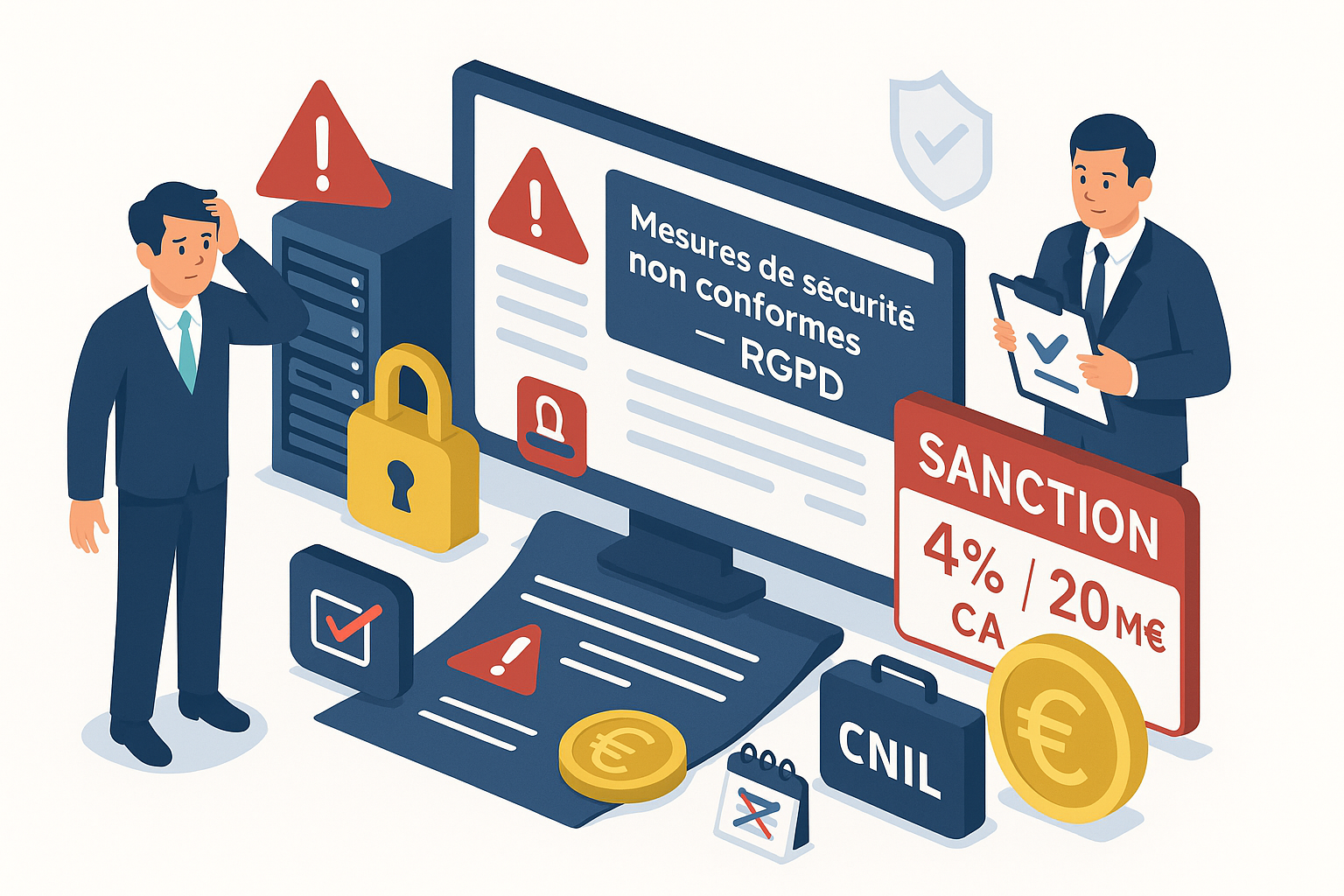The Big Data revolution brings with it new legal obligations, particularly when personal data is processed.
In an economic world undergoing rapid digital transformation, data has become the fuel for innovation and the engine of growth for many organizations. Companies are collecting, analyzing and exploiting ever greater volumes of data to optimize their operations, personalize their offers and develop new business models.
However, this Big Data revolution is accompanied by an increasingly restrictive legal framework, particularly when the data concerns identified or identifiable individuals.
Faced with this growing regulatory complexity, the intervention of a CNIL lawyer becomes a major strategic asset for navigating this demanding legal environment while fully exploiting the potential of your data.
If you need a CNIL lawyer, contact me!
Evolving legal framework: towards stronger data protection
The regulatory landscape surrounding the use of data has undergone major transformations in recent years, with the adoption of founding texts that redefine the obligations of companies.
From the RGPD to the IA Act: an ambitious European framework
The General Data Protection Regulation (GDPR), which came into force in May 2018, is the cornerstone of this new regulatory era. This text has revolutionized the approach to data protection by introducing fundamental principles such asaccountability, transparency, data minimization and privacy by design.
More recently, the European Union has adopted a number of sector-specific regulations to complement this framework: the Digital Services Act (DSA), the Digital Markets Act (DMA) and the Artificial Intelligence Regulation (AI Act), which impose specific obligations in terms of algorithmic processing, transparency and risk assessment.
The expertise of a legal advisor is particularly valuable in this context of superimposed standards. A CNIL lawyer lawyer masters these different bodies of law and their interactions, enabling you to identify the provisions applicable to your specific activity and anticipate changes in regulatory constraints.
Specific French constraints: the central role of the CNIL
In France, the Commission Nationale de l'Informatique et des Libertés (CNIL) plays a particularly active role in interpreting and applying the RGPD. It regularly publishes guidelines, recommendations and benchmarks that specify the practicalities of compliance in different sectors or for different types of processing.
In addition, the CNIL has considerably stepped up its monitoring and sanctioning activities. In 2023, it handed down record fines of several tens of millions of euros, particularly targeting projects involving massive data processing or innovative technologies such as artificial intelligence.
A lawyer's strategic mediation proves decisive in correctly interpreting the CNIL's sector-specific positions and translating them into operational measures adapted to your corporate context. His expertise will enable you to anticipate the specific expectations of the French regulator and prepare effectively for any inspections that may be required.
Sectors particularly concerned by the legal challenges of big data
While all organizations are affected by these regulatory developments, some sectors are receiving particular attention due to their intensive use of data or the sensitivity of the information they process.
The health and medical research sector
The healthcare sector represents particularly fertile ground for Big Data applications, with considerable stakes involved in improving care paths, medical research and public health. Artificial intelligence projects applied to medical diagnosis, clinical studies based on the analysis of massive data, and telemedicine devices are all promising innovations.
However, these initiatives involve the processing of healthcare data, considered particularly sensitive by the RGPD and subject to specific rules under French law (notably via the Health Data Hub and the Système National des Données de Santé).
The personalized legal support offered by a CNIL lawyer is crucial to navigating this complex framework. He or she will help you determine the legal regime applicable to your specific project (research, care, evaluation of professional practices), identify the competent authorities (CNIL, CPP, CESREES) and put together the regulatory files needed to obtain the required authorizations without compromising your innovation objectives.
Digital marketing and targeted advertising
The digital marketing sector has been profoundly transformed by the exploitation of massive data, enabling ever finer personalization of advertising messages. However, this evolution is accompanied by a reinforced legal framework, particularly with regard to cookies and other tracers, profiling and automated decision-making.
The scheduled end of third-party cookies, increasing restrictions on tracking technologies and the requirement for explicit, informed consent are upsetting established models and forcing industry players to rethink their strategies.
The forward-looking vision of expert legal counsel is a considerable asset in this changing context. A lawyer can help you design data collection and exploitation strategies that comply with current and future regulatory requirements, while preserving the performance of your marketing campaigns. He or she can also help you set up effective consent mechanisms and draw up transparent privacy policies.
The financial and insurance sector
Financial institutions andinsurance companies are pioneers in the use of Big Data, whether to assess risk, detect fraud, automate processes or personalize offers. However, these innovations are accompanied by particularly stringent regulatory requirements.
In addition to the RGPD, these players must comply with sector-specific regulations such as MiFID II, which imposes specific obligations in terms of transparency and investor protection, or the European Banking Authority's guidelines on cloud outsourcing.
The sector-specific expertise of a CNIL lawyer is a key to performance in this highly regulated environment. He can help you reconcile technological innovation with regulatory compliance, by drawing up solid legal packages that secure your data projects without hindering their deployment. His in-depth knowledge of the positions of the various regulatory authorities (CNIL, ACPR, AMF) enables you to anticipate regulatory developments and adapt your strategy accordingly.
The specific legal challenges of artificial intelligence
Artificial intelligence today represents the most advanced frontier in the exploitation of massive data, with revolutionary applications but also unprecedented legal and ethical challenges.
The new challenges posed by the European AI Regulation
The adoption of the European Regulation on Artificial Intelligence (AI Act) marks a decisive step in the supervision of these technologies. This text, which will gradually come into force until 2026, introduces a graduated, risk-based approach:
- AI systems that present an unacceptable risk are prohibited (social rating, subliminal manipulation systems, etc.).
- High-risk systems are subject to strict requirements (risk assessment, human supervision, transparency, etc.).
- Limited-risk systems must comply with certain transparency requirements
- Minimal-risk systems benefit from a lighter regime
Strategic planning facilitated by a legal expert becomes essential to anticipate the impact of these regulations on your AI projects. A lawyer can help you to legally qualify your technological solutions, assess their level of regulatory risk and put in place the appropriate compliance measures. His or her intervention enables you to integrate legal requirements right from the design phase of your systems, thus considerably reducing subsequent compliance costs.
Balancing innovation and protection: the case of LLMs
Large Language Models (LLMs) such as those underlying the latest generation of conversational agents perfectly illustrate the tension between innovation potential and legal risks.
These technologies raise complex issues of copyright, responsibility for generated content, algorithmic transparency and potential discrimination. In 2023, the CNIL published a specific position on this subject, advocating a cautious, well-documented approach.
The in-depth legal support offered by a CNIL lawyer enables you to deploy these innovative technologies while controlling the associated risks. He or she will work with you to develop an appropriate compliance strategy, including impact analyses, data governance policies and quality control mechanisms. His expertise also helps you to structure your contractual relations with your technology suppliers, so as to legally secure the use of these powerful tools.
How does a CNIL lawyer secure your data projects?
Faced with these complex legal challenges, a data lawyer adds considerable value at every stage of your projects involving massive data processing.
Preliminary analysis and risk anticipation
Even before launching a data or big data project, a CNIL lawyer can help you assess its legal feasibility and anticipate the applicable regulatory constraints.
This preliminary analysis covers a number of aspects: the lawfulness of the proposed data collection, identification of the appropriate legal bases, assessment of potential international transfers, anticipation of the administrative formalities required, and analysis of the impact on the rights and freedoms of data subjects.
The holistic vision of a legal advisor enables you to identify major points of attention right from the initial design phases, thus avoiding costly reorientations after deployment. This preventive approach transforms regulatory constraints into opportunities to improve your project, reinforcing its robustness and social acceptability.
Setting up appropriate governance
To ensure data compliance, it is essential to establish solid governance, clearly defining the roles and responsibilities of each player involved in the data lifecycle.
This governance includes designating data controllers and subcontractors, clarifying relationships with technology partners, establishing validation and control processes, and documenting the choices made to demonstrate compliance(accountability).
The legal architecture established by a CNIL (French Data Protection Authority) lawyer forms the basis for the long-term, secure use of your data. His mastery of the various possible contractual arrangements (joint liability, subcontracting, international transfers) enables you to optimize the distribution of responsibilities while preserving your access to the technological resources required for your project.
Ongoing operational support
Beyond the initial analysis and design of governance frameworks, a lawyer will support you throughout the lifecycle of your data projects to ensure long-term compliance.
This support includes drawing up and updating compliance documents (processing registers, impact analyses, internal policies), managing relations with regulatory authorities, training teams in the legal issues surrounding data, and adapting your practices to changes in regulations and case law.
The ongoing support of a legal expert enables you to maintain a high level of compliance without sacrificing the agility required for innovation. By keeping you abreast of normative developments relevant to your sector and proposing proportionate adjustments, a CNIL lawyer helps you to perpetuate your investments in data technologies while minimizing the associated legal risks.
Making the law a performance driver for your data projects
In an environment where data is a major strategic asset, but also a significant source of legal risk, the support of a CNIL lawyer represents much more than a simple compliance approach: it is a real lever for performance and differentiation.
By transforming regulatory constraints into opportunities to improve your processes, providing legal certainty for your technological innovations and helping you build a relationship of trust with your customers and partners, a data lawyer contributes directly to the creation of value within your organization.
Our CNIL compliance law firm has in-depth expertise in supporting data and big data projects, covering all the legal issues associated with the exploitation of massive data. Whether you're an innovative start-up developing solutions based on artificial intelligence, an established company looking to add value to your data assets, or a public sector organization committed to an open data approach, our experts can help you make the law an ally in your digital transformation.




